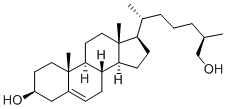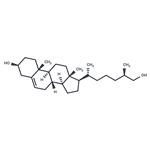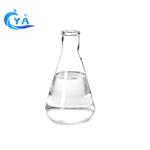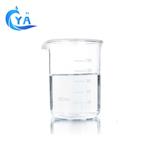Description
27-Hydroxycholesterol (27-HC) is an endogenous oxysterol with multiple biological functions, including activity as a selective estrogen receptor modulator (SERM) (a mixed, tissue-specific agonist-antagonist of the estrogen receptor (ER)) and as an agonist of the liver X receptor (LXR). It is a metabolite of cholesterol that is produced by the enzyme CYP27A1. A link between high cholesterol and breast cancer has been identified, and it has been proposed that this is due to 27-HC production by CYP27A1. Because of its estrogenic action, 27-HC stimulates the growth of ER-positive breast cancer cells, and has been implicated in limiting the effectiveness of aromatase inhibitors in the treatment of breast cancer. As such, identified CYP27A1 inhibitors, including the marketed drugs anastrozole, fadrozole, bicalutamide, dexmedetomidine, ravuconazole, and posaconazole, have been proposed as potential adjuvant therapies in ER-positive breast cancer.
www.abbexa.com/human-27-hydroxycholesterol-elisa-kit
Uses
The liver x receptors (LXRα and LXRβ) are nuclear hormone receptors whose native ligands, oxysterols, induce the expression of genes involved in cholesterol and fatty acid metabolism. 27-hydroxy Cholesterol, a sterol 27-hydroxylase-mediated cholesterol hydroxylation product, activates LXRα and LXRβ in vitro with EC50 values of 85 and 71 nM, respectively, and is a potent suppressor of cholesterol biosynthesis. 25(R)-27-hydroxy Cholesterol is the more predominant-occurring (~80%) stereoisomer of the endogenous oxysterol 27-hydroxy cholesterol.[Cayman Chemical]
Definition
ChEBI: 27-Hydroxycholesterol is a 26-hydroxycholesterol in which the 25-position has R-configuration. It has a role as an apoptosis inducer, a neuroprotective agent, a human metabolite and a mouse metabolite. It is functionally related to a cholesterol.
Application
27-hydroxycholesterol (27-HC) is synthesized from cholesterol by the action of sterol 27-hydroxylase in liver. It is an abundant oxysterol in the circulation ranging from 0.15 to 0.73 μM. 27-HC serves as a substrate for bile synthesis.
27-hydroxycholesterol has been used:
to test its inhibitory effect on hepatic lipid accumulation
as liver X receptor (LXR) ligand in breast cancer cell lines
as a control in liquid chromatography with tandem mass spectrometry (LC-MS-MS) for the quantitation of 25-OHC in jejunum samples
General Description
27-Hydroxycholesterol (20380-11-4) is a metabolite resulting from the action of sterol 27-hydroxylase on cholesterol. Concentrations of 27-hydroxycholesterol are elevated in patients with Alzheimer’s disease and mild cognitive impairment. 1,2 Endogenous selective estrogen receptor modulator3 and ligand for the liver X receptor(EC50M= 85nM for LXR7alpha; and 71nM for LXRβ)4.
Mode of action
27-Hydroxycholesterol is an endogenous metabolite of cholesterol produced by the hydroxylation of the carbon at position 27 by the enzyme sterol 26-hydroxylase, mitochondrial (CYP27A1). Some neoplasms produce excess of 27-hydroxycholesterol (27HC) or inhibit its catabolism, and high cholesterol levels are correlated with elevated levels of 27HC; under these conditions, 27HC may have deleterious selective estrogen receptor modulator (SERM) and liver X receptor (LXR) agonistic activities. As a SERM, 27HC binds to and prevents the activation of estrogen receptors (ERs) in the vasculature. This prevents ER-mediated vasodilation and abrogates the cardiovascular protective effects of estrogen. However, 27HC binds to and activates ERs and LXRs in breast tissue, which stimulates ER-dependent breast cancer cell growth and metastasis.
pubchem.ncbi.nlm.nih.gov/compound/27-Hydroxycholesterol
References
1) Heverin et al. (2004), Changes in the levels of cerebral and extracerebral sterols in the brains of patients with Alzheimer's disease; J. Lipid Res.,?45?186
2) Shafaati et al. (2011), Marked accumulation of 27-hydroxycholesterol in the brains of Alzheimer's patients with the Swedish APP 670-671 mutation; J. Lipid Res.,?52?1004
3) Umetani et al. (2007), 27-Hydroxycholesterol is an endogenous SERM that inhibits the cardiovascular effects of estrogen; Nature Medicine,?13?1185
4) Fu et al. (2001), 27-Hydroxycholesterol is an endogenous ligand for liver X receptor in cholesterol-loaded cells; J. Biol.Chem.,?276?38378



